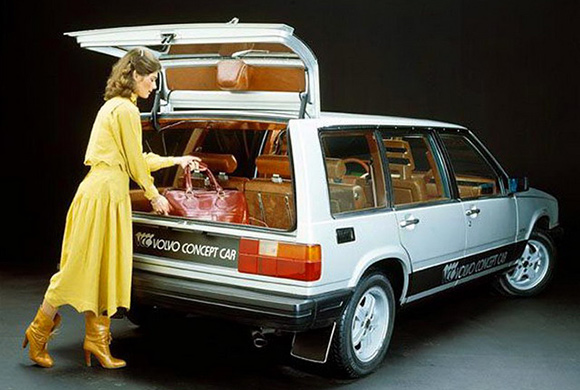
Apparently a hatch rear window was an idea for Volvos back in 1980. More images here.

Apparently a hatch rear window was an idea for Volvos back in 1980. More images here.
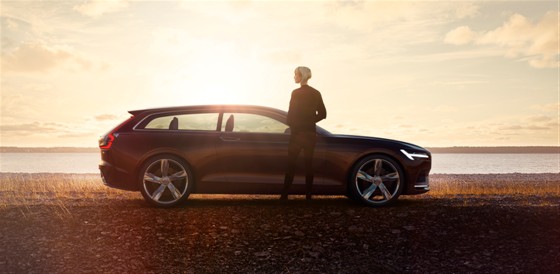
Volvo released video and images of their Estate concept car, a two-door wagon inspired by the 1800 of old. So I suppose the Volvo wagon isn’t dead after all? We’ll see if it makes it to production.
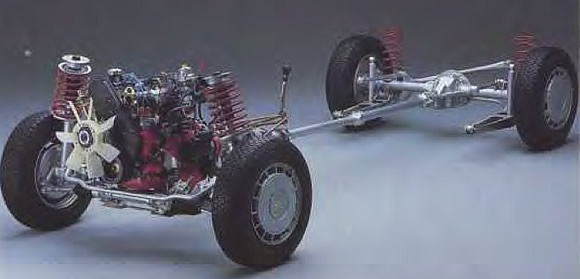
Once again CNN Money’s Alex Taylor III writes an odd article based on a ridiculous premise that goes nowhere. While we previously heard him pontificate about station wagons, this time Taylor III writes of what he calls the “Curse of the Volvo 240“.
After writing about how the 240 has achieved a cult-like status as the lovable loser of the auto world, he then documents the decline of the Swedish company after the model was discontinued. He gives a basic history lesson that includes the attempt to shape Volvo as a luxury brand, the buyout by Ford in 1999 and the current resting place within the stable of China’s Zhejiang Geely Holding Group.
Rather than examining how the 240 cemented the brand’s reputation for safety and reliability, creating a “halo effect” that helped lift the public’s perception of subsequent models, Taylor III writes of the “bad luck” the company endured as it moved away from boxy and homely to sleek and luxurious. He sees the decline in sales as the result of a “jinx”, rather than a series of poor decisions by management and an inability to provide consumers with cars that are affordable and smart.
By allowing branding focus groups to guide decision making, Volvo lost an opportunity to exploit the niche, devoted following their company had established. The resulting decline is sales wasn’t from some weird, supernatural phenomenon; it was from the experience of consumers and their ability to see that the magic was gone. Alex Taylor III has it exactly backwards.
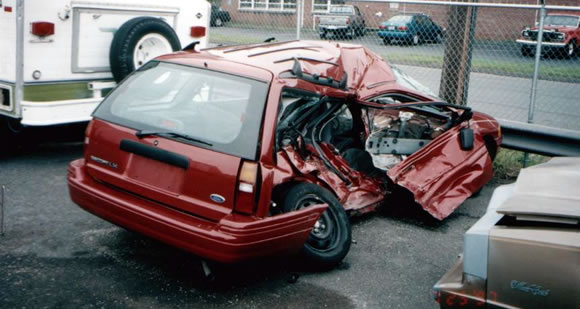 Volvo announced in January that they will discontinue the V50 in the US. In writing about the death of the last Volvo station wagon, CNN Money’s Alex Taylor III posted an odd article reminiscing about his youth in the suburbs of the 1950s while positing that the death of wagons in the US was pretty much inevitable.
Volvo announced in January that they will discontinue the V50 in the US. In writing about the death of the last Volvo station wagon, CNN Money’s Alex Taylor III posted an odd article reminiscing about his youth in the suburbs of the 1950s while positing that the death of wagons in the US was pretty much inevitable.
His description of the wagons of the 1960s seems to place all of the problems with American cars on the shoulders of station wagons:
American buyers first turned away from station wagons during the 1973 oil crisis. Their extreme length, emphasized by long rear overhangs to accommodate a third seat, made them natural targets.
Sorry, but almost all American cars were lengthy and heavy boats back then, not just wagons. There is nothing intrinsic to the wagon platform that says it needs to be the length of an aircraft carrier. That’s just what Detroit was making at the time.
He then speaks of the rise of the SUV as if it was a rational change for American buyers, while completely overlooking the fact that they have the same problems of poor fuel economy and extreme length that the cars of the 60’s did. He claims that they are “far more utilitarian” than wagons and offered “a lot more cargo space.”
There are many, often irrational, reasons Americans moved to SUVs, but the idea that wagons have less utility is ridiculous. I’ve got more space in the back of my brick than my buddy has in his Nissan Pathfinder. Yes, SUVs have 4-wheel drive, but that only contributes to their poor gas mileage and most drivers don’t need it anyway. AWD anyone?
As for Volvo, he sees their reputation for reliability as a problem, rather than a benefit:
Volvo probably did itself a disservice by running testimonials from owners who drove their Volvos for years and years. When you put a million miles or more on a car, it limits the opportunity for repeat business.
Yes, automakers shouldn’t tout longevity as an asset. They should just make cars that fall apart in 6 years so they can sell a new one. That’s what Detroit did, right? We can see how well that did for them.
In trying to find out if my vehicle has EGR or not I discovered a site that decodes the Vehicle Identification Number for many Volvo cars. I discovered my brick has “Super Ultra-Low Emissions” and was built in Gothenburg, Sweden.

Check out the full evolution here.

We know Volvo loves to crash their vehicles to demonstrate safety features, but in a recent demo the crash was truly an accident. To show off their Collision Avoidanceâ„¢ system with Full Auto Brakeâ„¢ technology, Volvo launched an equipped S60 toward a stationary truck at 20 mph, in front of press and video cameras. Unfortunately, the system failed and the car plowed into the bumper, destroying the front end of the vehicle and the careers of the people in Volvo’s PR and engineering departments.
So deadpan; so awesome.

Pictured above is Swedish deputy Prime Minister Maud Olofsson at yesterdays announcement of the sale of Volvo cars to the Chinese company Geely.
“Regardless of who owns Volvo Cars, its brand will still be Swedish.”
Unlike some Volvophiles, I couldn’t care less who owns the company. People are going to start hooting and hollering about this sale now that the rumors have been confirmed, but does it really matter? The important question is “Does the car suck or not?”
Critics, including Consumer Reports, have complained that the quality of Volvo cars has suffered since Ford purchased it in 1999. Is quality really going to get a whole lot worse now that it’s owned by Geely? Or is that just a xenophobic reaction about the supposed inferiority of Chinese workmanship?
Who defines a corporation’s product anyway? The nation that owns the company? The nation that originated the company? The nation where the cars are built? The nation where the cars are driven? Why is a Toyota that’s built in the US still a Japanese car, while a Volvo or Saab that’s owned by an American or Chinese company is still a Swedish car?
The idea of a nationally branded car is quaint. When Ford bought Volvo the brand ceased to “be Swedish,” whatever that means. It became just another commodity in a global marketplace that gets parts contracted out to companies all over the world but has the imprimatur of a corporate board and an aura constructed by the branding wizards of the marketing department.
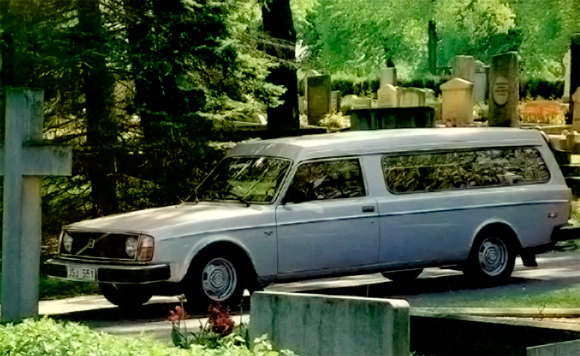
According to a memo leaked to Jalopnik, the Volvo V70 will not be offered in North America after 2010. And while the V50 will still be available, its time may be numbered. That means the name “Volvo” may no longer be synonymous with “station wagon.”
I remember checking out the NY Auto show 4 or 5 years ago and being surprised that there was no V70 on display. I guess they had started the process of phasing it out back then. I was told that the XC70 was just like the V70, but, I’m sorry, it’s not. I don’t count the XC70 as a wagon, and Jalopnik agrees. However, Volvo execs feel that “the personality of the XC70 is a good fit for today’s lifestyles.” To which commenter chathamh responds:
If the current product lineup of most manufacturers was an accurate reflection of American lifestyles, most Americans would spend their free time fording creeks, hauling trailers, powering through snow drifts and traversing miles of unpaved mountain trails.
Today’s manufacturers, at least for cars in the US market, don’t understand that not everyone wants to have to choose between a vanilla mid-sized sedan and a blinged out monster truck. I’ve purchased 2 cars in my life, a 745t and my current 245. What brought me to Volvo wasn’t their “personality”. It was the fact that they made really nice station wagons, vehicles that had great carrying capacity, had a relatively low center of gravity and drove like cars. Europeans understand this. In my visits to Germany and France I’m always impressed that they had such beautiful, sleek wagons. They understand that you can increase carrying capacity without raising the vehicle sky-high, tacking on knobby tires and forcing the driver to sit upright. That’s why Volvo will still be making the V70 for the European market.
This news from Volvo goes hand-in-hand with what’s happened to Subaru’s once sexy Legacy wagon. They dropped it a few years ago in favor of the Outback, and then they converted the Outback into a bloated crossover SUV. Someone in my neighborhood just got one of these abominations and I shudder every time I walk by it. Doesn’t Subaru already litter our aesthetic landscape enough with the Tribeca? How is the Outback any different?
Jalopnik posted a heart-warming eulogy to the Volvo wagon, a historic look back at the rise and sudden fall of the iconic boxy brick. RIP.
PS. I hope to wake up tomorrow and find this was all a horrible nightmare. Or maybe I should just get a life, because I’m not in the market for a new car anyway, and I’ll probably drive my precious 245 into my grave!
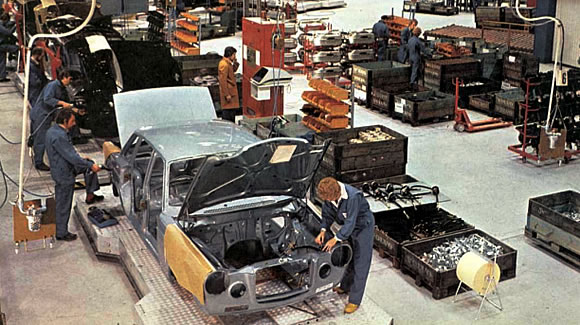
The video below offers a glimpse of the Volvo assembly line in Kalmar, Sweden in the early 1970s as it produces the 200 series model. It’s an educational video demonstrating new factory production techniques pioneered by Volvo and offers an amazing glimpse at how Volvo was trying to humanize the assembly line and improve worker’s satisfaction with their jobs.
IPD posted the video on their site, and I did a little research to find more info on this particular plant and the rational behind Volvo’s new assembly line.
Continue reading